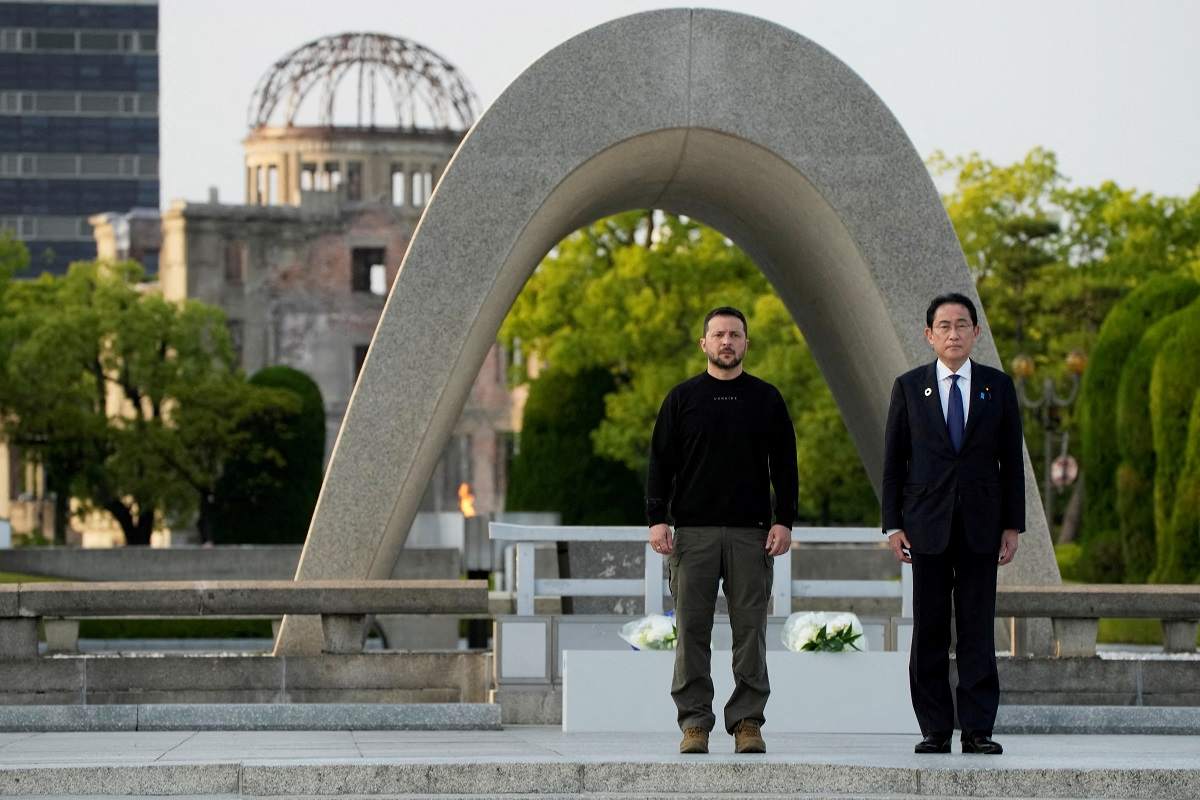
Ukrainian President Volodymyr Zelenskiy and Japanese Prime Minister Fumio Kishida, pose for a photo after laying a wreath in front of the Cenotaph for the Victims of the Atomic Bomb at the Hiroshima Peace Memorial Park, after Zelenskiy was invited to the Group of Seven nations’ summit in Hiroshima, Japan, May 21, 2023.
15:42 JST, August 7, 2023
On Aug. 6, 1945, the United States dropped an atomic bomb on the Japanese city of Hiroshima, followed three days later by another one on Nagasaki. The world’s first – and so far only – wartime atomic bombings remain seared in the minds of all those alive at the time and are often invoked as reminders of the disastrous consequences of nuclear armament.
In the 78 years since, Japan’s government, as well as the United Nations and others, have promoted the goal of a nuclear-free world. But that goal has become “more difficult,” in part because of Russia’s invasion of Ukraine, Japanese Prime Minister Fumio Kishida said Sunday at a memorial ceremony in Hiroshima.
“As the only country to have experienced the horror of nuclear devastation in war, Japan will press on tirelessly with its efforts to bring about” nuclear disarmament, Kishida said. “The widening division within the international community over approaches to nuclear disarmament, the nuclear threat made by Russia, and other concerns now make that road all the more difficult.”
Still, he continued, “it is precisely because of these circumstances that it is imperative for us to reinvigorate international momentum once more towards the realization of a ‘world without nuclear weapons.'”
Since Russia’s invasion of Ukraine, Kremlin officials have, in their rhetoric and actions, attempted to use the threat of a nuclear attack to scare Western countries into halting their aid to Kyiv. In February, Russian President Vladimir Putin suspended Russia’s participation in the New START nuclear nonproliferation agreement, the last remaining arms control treaty between Washington and Moscow. And in recent weeks, Putin claimed to have moved nuclear weapons to Russia’s ally and neighbor Belarus.
The specter of nuclear war raised by Russia’s war in Ukraine led scientists in January to set the Doomsday Clock 90 seconds away from “midnight” – the closest it has ever been to the symbolic hour of apocalypse, as The Washington Post has reported.
Anxiety about nuclear escalation could be felt Sunday in Hiroshima, at the Peace Memorial Ceremony, a yearly event to promote world peace and keep alive the memory of the victims of the bombings.
“Leaders around the world must confront the reality that nuclear threats now being voiced by certain policymakers reveal the folly of nuclear deterrence theory,” Hiroshima Mayor Kazumi Matsui said at Hiroshima, according to Reuters.
“The drums of nuclear war are beating once again,” U.N. Secretary General António Guterres warned, in remarks delivered by U.N. High Representative for Disarmament Affairs Izumi Nakamitsu.
More than 100,000 people were killed by the bombing of Hiroshima, and at least 70,000 were killed in Nagasaki. The exact toll from the bombings is still subject to some disagreement among historians.
Around sunrise on Sunday, at the site of a memorial to the victims of the bombing, people lit candles, burned incense and prayed.
At 8:15 a.m., the exact time when the atomic bomb was released over Hiroshima 78 years ago, a bell rang over the gathering, followed by a minute of silence, according to Reuters. Some 50,000 people, including survivors of the bombing, took part in the ceremony in 86-degree heat (30 Celsius), Reuters reported.
During the ceremony, Kishida and others laid flowers at Peace Memorial Park and dedicated a register containing the names of the victims of the bombing, according to a schedule of events released by the city.
The release last month of Christopher Nolan’s “Oppenheimer” – a biopic about J. Robert Oppenheimer, the scientist who led the Manhattan Project, the clandestine U.S. effort to develop an atomic bomb during World War II – has brought renewed attention to the history of the bombings of Hiroshima and Nagasaki. Some viewers have criticized the film for not featuring Japanese victims.
In his speech on Sunday, Kishida said what happened in Hiroshima and Nagasaki “must never be repeated.”
He said that Japan would continue to advocate on the world stage for nuclear disarmament.
Small protests and rallies were planned in parts of the world on Sunday to mark the anniversary of the bombings. In India, protesters marched with their faces covered in paint, with messages like “no war” and “no bomb” on them.
Top Articles in News Services
-

Survey Shows False Election Info Perceived as True
-

Hong Kong Ex-Publisher Jimmy Lai’s Sentence Raises International Outcry as China Defends It
-

Japan’s Nikkei Stock Average Touches 58,000 as Yen, Jgbs Rally on Election Fallout (UPDATE 1)
-

Japan’s Nikkei Stock Average Falls as US-Iran Tensions Unsettle Investors (UPDATE 1)
-

Trump Names Former Federal Reserve Governor Warsh as the Next Fed Chair, Replacing Powell
JN ACCESS RANKING
-

Producer Behind Pop Group XG Arrested for Cocaine Possession
-

Japan PM Takaichi’s Cabinet Resigns en Masse
-

Man Infected with Measles Reportedly Dined at Restaurant in Tokyo Station
-

Israeli Ambassador to Japan Speaks about Japan’s Role in the Reconstruction of Gaza
-

Videos Plagiarized, Reposted with False Subtitles Claiming ‘Ryukyu Belongs to China’; Anti-China False Information Also Posted in Japan
























